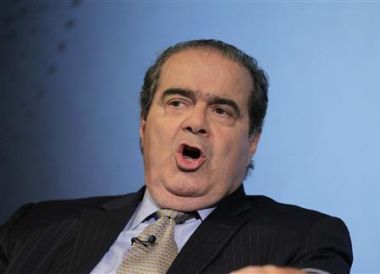Christian America? Yes, says Justice Scalia – but is he right?

America is a famously religious country, with rates of churchgoing that cynical old Europe can only dream of. Even so, one of the most fundamental principles of its public life is the separation of church and state. Not only is there no state church, but increasingly, state funding and recognition of religious expression has been challenged in the courts.
Step forward Supreme Court Justice Antonin Scalia, a famously conservative voice on the bench, who in a brief address to a Catholic high school in a New Orleans suburb put the cat of religion among the pigeons of secularism.
A nice metaphor, but what did he actually say?
Thank you. Scalia said that contrary to what people – including lawyers – had assumed, the state didn't have to be neutral about religion. "To be sure, you can't favour one denomination over another, but we can't favour religion over non-religion?" He also said there is "nothing wrong" with the idea of presidents and others invoking God in speeches. Instancing such varied examples as the Revolution and the Battle of Midway, he said: "I think one of the reasons God has been good to us is that we have done him honour."
I thought we lost the Revolution because we had useless generals and lots of us thought the Americans had a rather strong case?
Let's stick to the point. Scalia's words have delighted conservatives but infuriated liberals, who think he's trying to undermine the constitution.
Remind me?
The relevant bit of the First Amendment says: "Congress shall make no law respecting an establishment of religion, or prohibiting the free exercise thereof". According to Cornell University Law School, "It forbids Congress from both promoting one religion over others and also restricting an individual's religious practices."
I thought Scalia's point was that it didn't stop the state favouring religion over non-religion?
Cornell again: "It also prohibits the government from unduly preferring religion over non-religion, or non-religion over religion."
That seems pretty clear.
Yes, though Scalia obviously disagrees. The Cornell article goes on: "Although some government action implicating religion is permissible, and indeed unavoidable, it is not clear just how much the Establishment Clause tolerates." It's all a bit murky; the Supreme Court has allowed prayers before legislative sessions and helps fund private religious schools with textbooks, but it's ruled against religious displays at courthouses and funding salaries at religious schools.
It's all a bit abstract. An example might help.
Take Roy Moore, the Alabama Supreme Court Justice, who erected a huge granite monument showing Ten Commandments in the state judicial building. After an expensive lawsuit he was compelled to remove it. In his judgment, Federal Judge Myron Thompson said that Moore "installed a two-and-a-half ton monument in the most prominent place in a government building, managed with dollars from all state taxpayers, with the specific purpose and effect of establishing a permanent recognition of the 'sovereignty of God,' the Judeo-Christian God, over all citizens in this country, regardless of each taxpaying citizen's individual personal beliefs or lack thereof. To this, the Establishment Clause says no."
There can't be too many people who want to put a granite monument to the Ten Commandments up in a public place.
Perhaps not, but the point is that people like Moore and Scalia believe that America is fundamentally a Christian country and that judges are using the law to get rid of religion from the public sphere against the intention of the country's founders.
This is beginning to seem like quite a familiar sort of argument.
Yes. In Britain we have an established Church that is entrenched within the legal systems of the state to such an extent that unpicking it would be more trouble than it's worth. Nowadays we all rub along pretty well – which was not the case when America was writing its constitution – though there are still periodic rows about how far Britain is a Christian country. Christians here get very wound up when they think secularists are trying to ban religion from public life, but in spite of our lower rates of churchgoing we are much more hospitable to faith in this respect than the US.
Ah, but for how long?
Long enough; don't worry. But on both sides of the Atlantic, Christians have to get used to having their spiritual dominance questioned. That's not a bad thing. What is bad is if we seem to be willing to use the law to assert Christian privileges at other people's expense. A little tolerance, patience and humility go a long way.
Follow @RevMarkWoods on Twitter.











